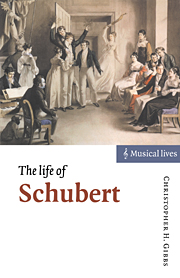Book contents
- Frontmatter
- Dedication
- Contents
- List of illustrations
- Acknowledgments
- Note on the text
- List of abbreviations
- Prologue: Schubert yesterday
- 1 Representing Schubert: “A life devoted to art”
- 2 Young Schubert: “The master in the boy”
- 3 Ingenious Schubert: “The prince of song”
- 4 Popular Schubert: “The turning point”
- 5 Dark Schubert: “A black-winged demon of sorrow and melancholy”
- 6 Poor Schubert: “Miserable reality”
- 7 Late Schubert: “Who shall stand beside Beethoven?”
- 8 Immortal Schubert: “Composing invisibly”
- Epilogue: Schubert today
- Notes
- Further reading
- Index
4 - Popular Schubert: “The turning point”
Published online by Cambridge University Press: 05 March 2015
- Frontmatter
- Dedication
- Contents
- List of illustrations
- Acknowledgments
- Note on the text
- List of abbreviations
- Prologue: Schubert yesterday
- 1 Representing Schubert: “A life devoted to art”
- 2 Young Schubert: “The master in the boy”
- 3 Ingenious Schubert: “The prince of song”
- 4 Popular Schubert: “The turning point”
- 5 Dark Schubert: “A black-winged demon of sorrow and melancholy”
- 6 Poor Schubert: “Miserable reality”
- 7 Late Schubert: “Who shall stand beside Beethoven?”
- 8 Immortal Schubert: “Composing invisibly”
- Epilogue: Schubert today
- Notes
- Further reading
- Index
Summary
1820 – this date constitutes a turning point [in Schubert's career], namely the first public appearance of his works.
Leopold von Sonnleithner, 1857 (SMF 118)One of the most durable of Schubert myths concerns the neglect he allegedly suffered at the hands of an indifferent public. Only faithful friends, so the story goes, appreciated his true worth and actively supported his art. Schubert is cast as the unrecognized creative genius, whose real accomplishment was discovered too late, long after his far too early death. As with many legends, this misleading image does, in fact, register significant realities of Schubert's unusual career. Some noteworthy features of his reputation come into clearer focus when we consider the unfolding of his compositional and professional activities within their contemporary context. Was Schubert's music really so neglected during his lifetime? What opportunities were available to him? And what was the true extent of his public fame at the time of his death?
In truth, Schubert's situation was both better and worse than myth would have it. While the public appreciated a large quantity of his music, few, even among his supportive friends, knew the full reach of his artistic accomplishment. Schubert was one of the most widely published and performed composers active in Vienna during the 1820s. Reviews and advertisements often referred to him as a “popular composer” (beliebter Tonsetzer), but the pieces that made him beloved were limited primarily to the relatively unprestigious Lied and other genres that did even less to enhance his stature – dances, part-songs, and short piano pieces. The symphonies, operas, religious and chamber music that would normally have launched and sustained a major reputation – that would have made him a “great” composer – were generally unknown until his last years and were, even then, still quite unrepresentative in relation to the actual scope of what he had composed.
- Type
- Chapter
- Information
- The Life of Schubert , pp. 60 - 90Publisher: Cambridge University PressPrint publication year: 2000



